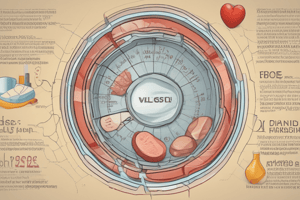Podcast
Questions and Answers
What is a common treatment option for post-acne scarring?
What is a common treatment option for post-acne scarring?
- Chemical peels (correct)
- Oral contraceptives
- Antibiotic therapy
- Tetracycline
Which type of acne is characterized by eruptions during the first few weeks of life?
Which type of acne is characterized by eruptions during the first few weeks of life?
- Occupational Acne
- Infantile Acne
- Neonatal Acne (correct)
- Acne Excoriée
Acne Excoriée typically results from what behavior?
Acne Excoriée typically results from what behavior?
- Excessive cleansing
- Hormonal changes
- Picking at lesions (correct)
- Genetic predisposition
Which method is NOT a surgical treatment option for acne scarring?
Which method is NOT a surgical treatment option for acne scarring?
Occupational acne is primarily linked to which factor?
Occupational acne is primarily linked to which factor?
What is a common characteristic of infantile acne?
What is a common characteristic of infantile acne?
What underlying condition is commonly associated with acne excoriée?
What underlying condition is commonly associated with acne excoriée?
Which of the following is NOT a characteristic of occupational acne?
Which of the following is NOT a characteristic of occupational acne?
Which topical retinoid is known for its comedolytic and anti-inflammatory properties?
Which topical retinoid is known for its comedolytic and anti-inflammatory properties?
Which among the following treatments primarily targets comedonal acne?
Which among the following treatments primarily targets comedonal acne?
What is a common age range for the initial presentation of topical tretinoin use?
What is a common age range for the initial presentation of topical tretinoin use?
Which of the following agents is most likely to cause drug-induced acne?
Which of the following agents is most likely to cause drug-induced acne?
Which symptomatic presentation is likely in young women suffering from acne excoriée?
Which symptomatic presentation is likely in young women suffering from acne excoriée?
What is the primary action of doxycycline in the treatment of acne?
What is the primary action of doxycycline in the treatment of acne?
Which hormonal treatment is commonly used for managing resistant acne in women?
Which hormonal treatment is commonly used for managing resistant acne in women?
What is a potential side effect of hormonal therapy using cyproterone acetate?
What is a potential side effect of hormonal therapy using cyproterone acetate?
Which medication is considered the standard treatment for severe acne resistant to other therapies?
Which medication is considered the standard treatment for severe acne resistant to other therapies?
What condition could indicate the need to consider hormonal therapy for acne treatment?
What condition could indicate the need to consider hormonal therapy for acne treatment?
Which antibiotic is known for its intrinsic anti-inflammatory properties in acne treatment?
Which antibiotic is known for its intrinsic anti-inflammatory properties in acne treatment?
What age group is most likely to benefit from hormonal therapy for persistent inflammatory acne?
What age group is most likely to benefit from hormonal therapy for persistent inflammatory acne?
Which of the following mechanisms is NOT associated with the action of oral contraceptive pills in treating acne?
Which of the following mechanisms is NOT associated with the action of oral contraceptive pills in treating acne?
Flashcards are hidden until you start studying
Study Notes
Acne Vulgaris Overview
- Acne vulgaris involves inflammation of the skin due to a combination of factors including hormonal changes and bacteria.
- Common symptoms include elevated cholesterol levels, myalgias (muscle pain), fatigue, and increased intracranial pressure leading to pseudotumor cerebri.
Surgical Treatment Options
- Comedo Extraction: Physical removal of comedones (clogged pores).
- Chemical Peels: Low-concentration peels using acids like α-hydroxy acids, salicylic acid, and trichloroacetic acid promote skin exfoliation.
- Intralesional Corticosteroid Injections: Used to reduce inflammation within lesions.
Post-Acne Scarring Treatments
- Dermabrasion: Mechanical exfoliation to improve skin texture.
- Laser Resurfacing: Uses laser technology to reduce imperfections in skin tone and texture.
- Deeper Chemical Peels: More intensive peels to treat scarring.
- Filler Substances: Used for discrete depressed scars.
- Punch Grafting: Surgical technique for "ice-pick" scars.
- Full-Thickness Surgical Excision: Removal of larger hypertrophic or aggregated pitted scars.
Oral Treatment Drugs
-
Antibiotics:
- Tetracycline derivatives (doxycycline, minocycline): Suppress P. acnes and reduce inflammation.
- Macrolides (erythromycin, azithromycin): Provide antibacterial properties with anti-inflammatory effects.
-
Hormonal Therapy:
- Combined oral contraceptives block ovarian and adrenal androgens, particularly beneficial for women with hyperandrogenism or PCOS.
- Cyproterone acetate (antiandrogen) combined with estrogens helps regulate severe acne in adults over 25.
-
Isotretinoin: Standard treatment for severe cases with notable side effects including dry skin and mood changes.
Special Forms of Acne
- Infantile Acne: Common in infants; resolves within 1-2 years, characterized by early comedo formation.
- Acne Excoriée: Results from systematic excoriation of lesions, often linked to psychological disorders.
- Drug-Induced Acne: Manifest as inflammatory papules and pustules from exposure to offending agents like oils and hydrocarbons.
- Occupational Acne: Caused by contact with follicle-occluding substances in workplace environments.
Topical Treatments
-
Topical Retinoids:
- Tretinoin, adapalene, and tazarotene normalize keratinization and have anti-inflammatory properties.
-
Benzoyl Peroxide: Antimicrobial agent effective against Propionibacterium acnes; reduces acne lesions.
Studying That Suits You
Use AI to generate personalized quizzes and flashcards to suit your learning preferences.




